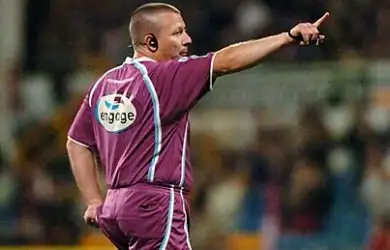On report – just a cop out

With Carl Ablett going unpunished during Friday’s Leeds-Wigan grudge match – for his illegal ‘challenge’ on Sam Tomkins – and his fate still to be decided by the RFL, what is the point of the ‘on report’ rule? Does it have any place in today’s game?
The incident involving Ablett was placed ‘on report’ by referee Steve Ganson, as was a raised knee in a tackle by Ryan Bailey, but he later saw fit to send Andy Coley to the sin-bin for a questionable late tackle on Rob Burrow.
The ‘on report’ system was introduced over 15 years ago now, and was intended to give referees the opportunity to refer possible foul play to the attention of the RFL, for scrutiny by video replay. The rule was to be applied only in situations that the referee could not be certain of.
But do referees now use it as a way to avoid making a decision? Well, it would appear to be an easy way out for officials, with the argument that the referee was unsighted (or behind the play) seeming a little thin, in an age of radio communication between the referee and his two touch judges, and the video referee. Even if all three officials at pitch level missed the incident, then the video referee cannot claim the same, with replay technology at his immediate disposal.
Perhaps – like the forward pass – foul play is deemed to be an area that cannot be referred ‘upstairs’ for the video ref to make a judgement on. If this is the case, then perhaps it’s time the RFL reviewed the situation.
The problem is that – although the ‘on report’ system allows for an eventual judgement to be made on the incident, and the offender to receive some sort of punishment – that punishment comes too late for the team ‘on the receiving end’ to benefit from it. Ablett’s ‘challenge’ has been given a grade C classification; meaning that a 2-3 game ban is a likely outcome, but how does that benefit Wigan? Wigan don’t play Leeds again within their next 3 games, so there is nothing for them to gain from any ban that Ablett receives.
One suggestion is that the final game of his ban be held back until Leeds play Wigan again, but I would argue that that would not stop referees using the ‘on report’ system as a way of avoiding making a real decision. A better suggestion is that the rule be removed from the game, and referees use the technology available to them (if required) to make the right decision at the time of the incident.
Nowadays any incident can be sighted after the game, and looked at by the RFL, before being referred to the disciplinary committee for their judgement, so the ‘on report’ system is effectively redundant anyway.
The Ablett incident, in the opinion of most rugby league watchers, deserved a red card, yet got nothing. The later incident involving Andy Coley, deserved no stronger punishment than a stern word from Mr Ganson, yet received a yellow card. Surely that is the worst thing about the current situation; the inconsistency it affords. Take away the ‘on report’ rule, and allow referees to use video replays for foul play, and you go some way to alleviating the inconsistent decision making which so annoys the average rugby league fan.